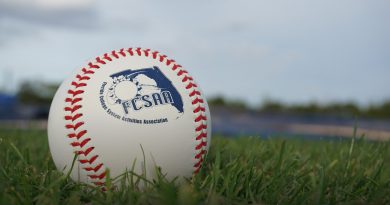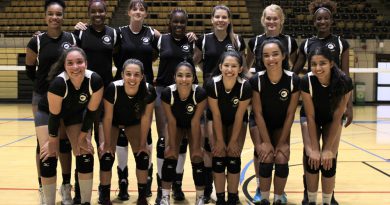Editorial: Responsibility Needs To Be Taken To Spur Student Attendance At Sporting Events
Miami Dade College athletics has consistently been among the elite programs nationwide.
The College has won 33 national championships and 117 state titles since 1964.
The volleyball team is a perennial powerhouse. They have competed in the past three national championship games—winning titles in two of those years. The softball team won a national championship in 2010 and the baseball team regularly surpasses 30 wins and captures a place in the state tournament.
This season, the women’s basketball team went undefeated at home (12-0).
Despite the success, the MDC’s athletic teams aren’t receiving vociferous support from the student body.
Go to any MDC athletic event and you will be lucky to find 25 people attending any given game. That should not be the case at a school that has more than 100,000 students.
The Student Life Department and the Athletics Department should be accountable for advertising and supporting student-athletes.
Athletic director Anthony Fiorenza said the athletic department sends emails with each team’s schedule to Kendall Campus’ Student Life on a regular basis. Lauren Adamo, the campuses’ Student Life Director, said her department does not send out emails promoting the games but the campus does.
Adamo doesn’t think it’s her department’s responsibility.
“Are you aware there is an MDC social media account and an MDC Kendall social media account? These college accounts are designed to promote all college activities, including that of Student Life and Athletics. Athletics also employs someone specially to market and promote for their department,” Adamo said in an email, responding to why Student Life, specifically the Campus Activities Board, which is the student event programming board, does not take advantage of its social media presence to promote athletic events.
The campus needs to work harder to attract the millennial and Gen Z audience. At no point this year was the women’s basketball team’s 12-game home winning-streak advertised as a means to attract an audience.
“Student Life has tried various tactics over the years to encourage participation at athletic events. In years past we have hosted Pep Rallies, supported the Cheer and Dance team (which no longer exists), provided a DJ for games and done half time activities,” Adamo said.
Why were these type of promotions stopped? A defeatist attitude of “we tried and it didn’t work” won’t make changes.
Yes, MDC is a commuter school. Yes, it does not have on-campus housing but it’s unacceptable to have only 25 people attend a campus sporting event. High school teams draw larger crowds. Our athletes spend tons of hours honing their skills. They deserve better.
Instead, we get band aides to treat a broken arm.
“This upcoming academic year, Student Government Association will have a committee pertaining specifically to MDC Spirit,” Adamo said. “This committee will be focused on encouraging MDC Students to see MDC as a school of choice, support Athletics, and overall increase their school pride.”
Why was this effort not made before? There doesn’t seem to be any consistency in trying.
Other schools make it work. They make attending sporting events a tradition.
Take Taylor University, a National Association of Intercollegiate Athletics school in Upload, Indiana that boasts a robust student body of 2,589. Every Friday before finals they host silent night, a ritual where students pack the men’s basketball gymnasium and remain quiet until the tenth point is scored. At that moment, the crowd erupts with constant cheering throughout, until the game’s waning moments when they sing Silent Night.
It’s a tradition they have employed since the 1980s. Today, Silent Night fills the gymnasium to maximum capacity.
Miami Dade College does not have to look far to find its own traditions. Our city is a cultural melting pot.
Simple methods like banging pots and pans together after a strikeout during baseball and softball games might make games more appealing to attend.
Fixing the problem will take time and work, but a consistent effort needs to be made before simply giving up and passing the responsibility along to the next person in charge.
We can do better. Our athletes deserve it.




